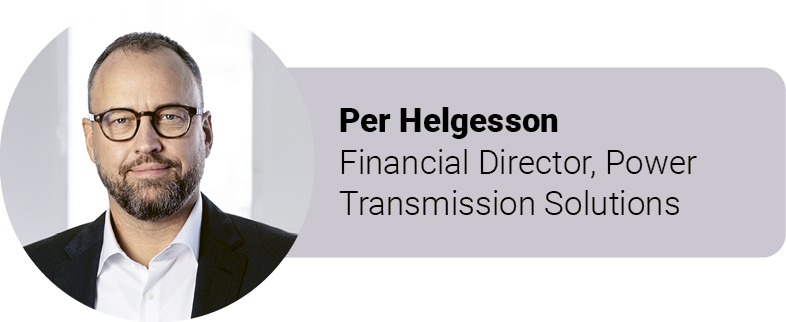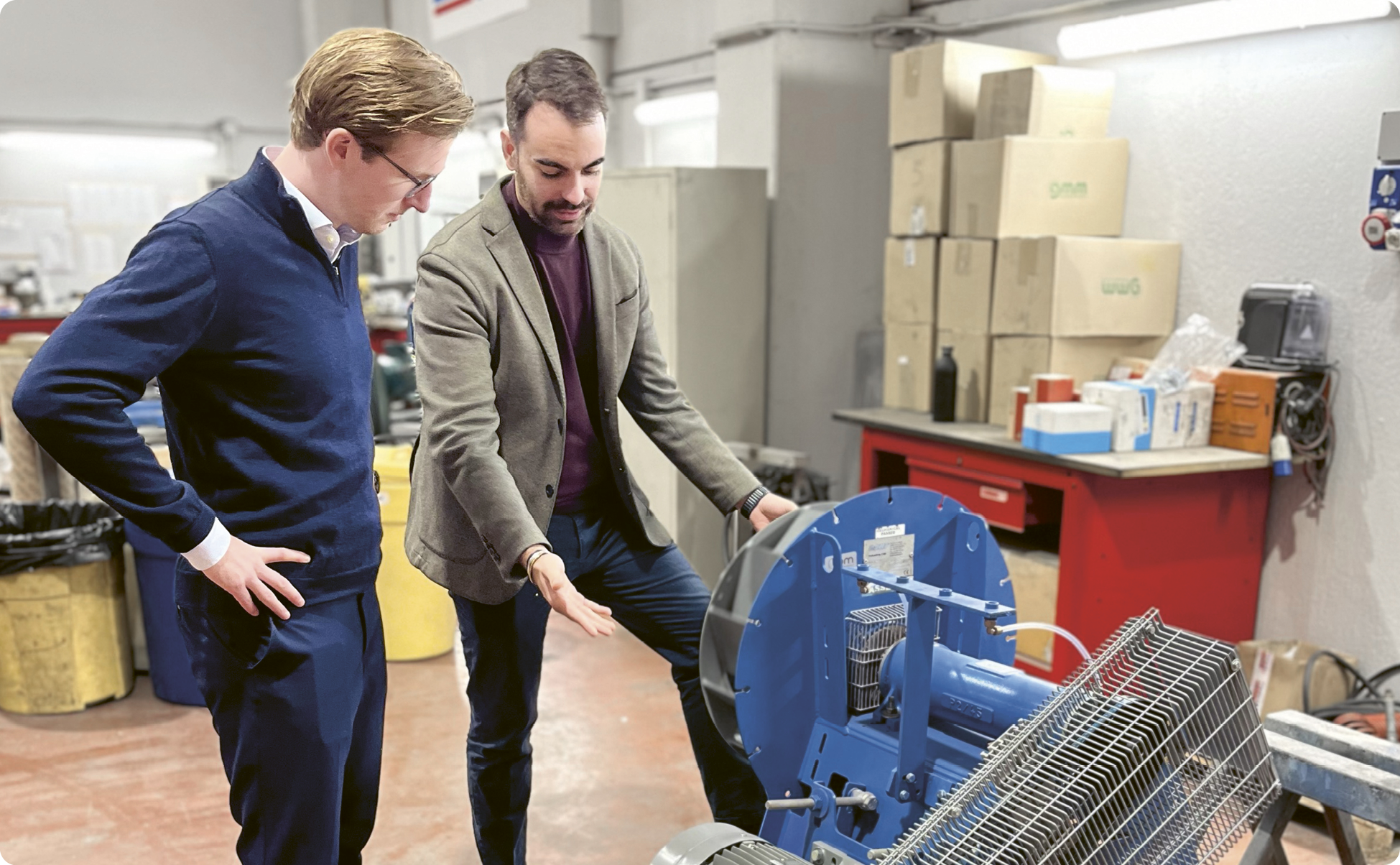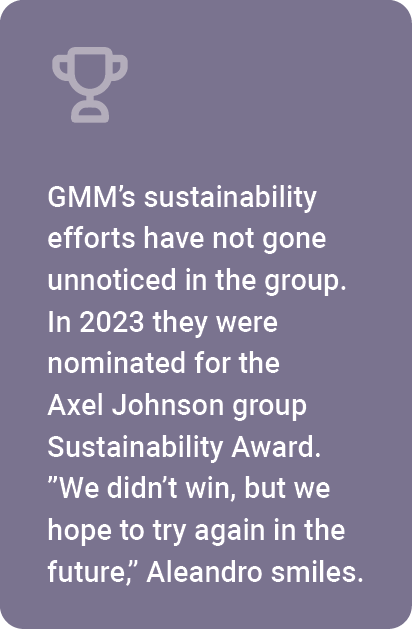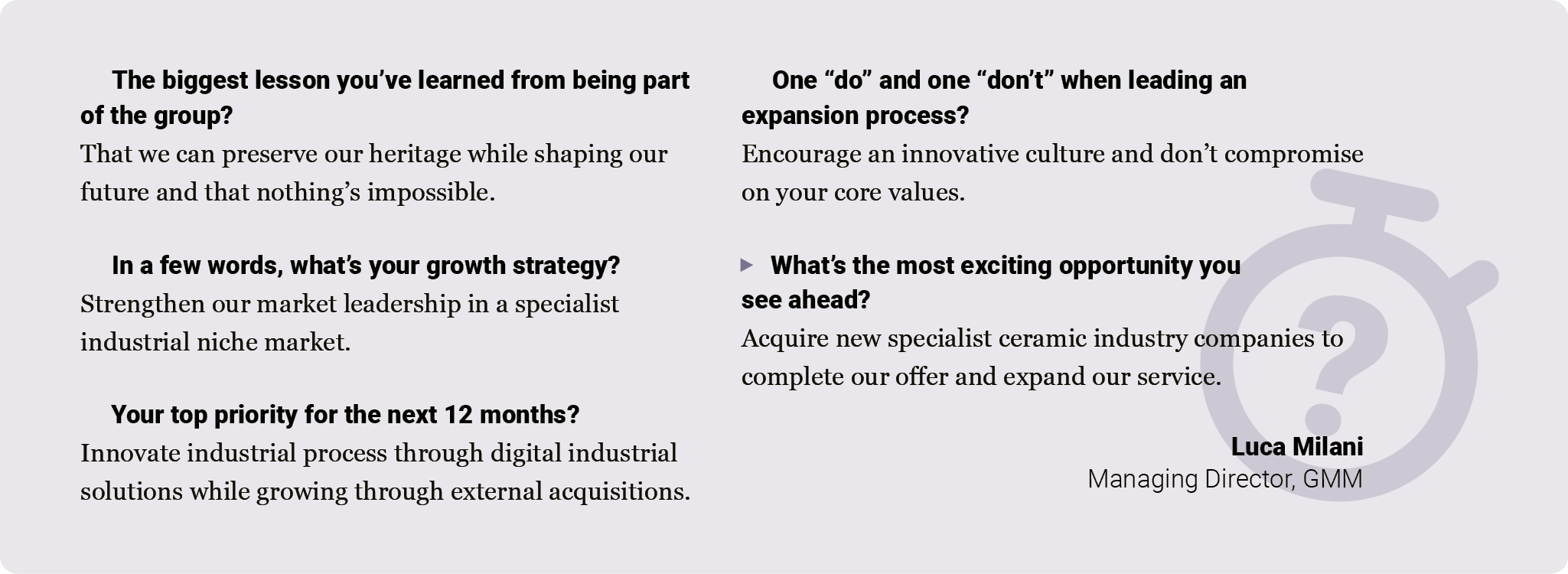From Successful Integration to Ambassadorship
GMM stands out as a remarkable success in seamless and effective acquisition integration. This Italian family business, renowned for its solid expertise and shared ambition to expand through innovation and circularity, has laid the foundation for impressive future growth.
If your home has Italian tiles on the walls or floors, there’s a good chance the stoneware comes from Modena in northern Italy. Known as “Ceramic Valley,” the region hosts an advanced cluster of ceramic tile producers served by specialist suppliers like Power Transmission Solutions company GMM, that became part of the business group in 2022. The company supplies gearboxes, bearings, motors, pumps, and other products and has an extensive service offering in condition monitoring and industrial remanufacturing. The company first received an approach about joining Axel Johnson International back in 2018. It soon became clear that the two organizations had a lot more in common than overlapping business interests.
 “We got to know the team and found many similarities with them. Like us, they are a family-owned business that is heavily engaged in sustainability, and I think we understood on both sides that we shared the same core values,” says Per Helgesson, Financial Director at Power Transmission Solutions.
“We got to know the team and found many similarities with them. Like us, they are a family-owned business that is heavily engaged in sustainability, and I think we understood on both sides that we shared the same core values,” says Per Helgesson, Financial Director at Power Transmission Solutions.
A stronger niche market player
At the time, GMM was busy accelerating an intensive growth and investment plan. When this was completed a couple of years later, the company was ready to join a larger group. The founder Attilio Milani was transferring the leadership to his son, Luca Milani, who felt the time was right for the business to strengthen its position as a niche market leader.

“Like us, the group takes a long-term view of the business and has a decentralized management model,” says Luca Milani, Managing Director of GMM. “They are also deeply committed to innovation. Today, half of GMM’s revenue comes from activities that we were not involved in ten years ago. The group has the same goal: to generate half its sales from new business every decade. We see innovation the same way, making us a good fit for each other. Retaining a minority shareholding in the combined business helped Luca to reassure employees who might be hesitant to the change of joining a larger business entity. “We had no staff turnover because of the change. Our people all supported it, recognizing that the businesses shared the same mindset and the group’s intention for us was to operate independently. That helped make the integration process smooth,”
Luca says.
Successful and efficient integration
Martin Magnusson, M&A Director at Power Transmission Solutions, says he was surprised how fast the company was integrated into the organization. “Almost immediately, Luca and Chief Operating Officer Aleandro Azzaro were reaching out to cooperate with other companies in the group.”
“From the start, GMM were unique in their forward-thinking approach. They didn’t just want to join the group; they wanted to explore every opportunity we could offer. Their philosophy was that if they could collaborate with other companies, they could reach new partners,” Martin says. AxFlow Italy was one of the first businesses they contacted. The two companies decided to share the same stand at a large international trade show, approaching potential customers together. And now, the two hope to work towards sharing best practices in pump refurbishment and distributorship. “Many of our end customers also have a need for pumps and products that AxFlow offer. So instead of going to a competitor for pumps, GMM went with the group’s offering. It was a nice product synergy,” Martin says.
Stronger customer and supplier relationships
Joining the group provided valuable resources from access to technology and products to a strong support network across Europe. Axel Johnson International’s decentralized management structure enabled them to retain their unique approach, but with the support of a large group. “Being part of the group allows us to preserve our heritage while shaping our future,” says Aleandro. He adds, ”It has also strengthened the relationships with customers and suppliers. With the backing of a larger group, we have added credibility and access to more resources, which has been very beneficial.”

Customers, too, have taken notice. The background presence of a major industrial group has instilled greater trust in the ability to deliver at scale. Aleandro concludes, ”Belonging to a larger, financially strong group makes it easier to negotiate better terms and has improved our standing in the industry.” Luca and Aleandro have some interesting plans in the pipeline, explaining that these financing opportunities are a key advantage in today’s competitive market.
 Sustainable Business Model
Sustainable Business Model
With a strong focus on energy-saving solutions, the company has integrated circularity services that reduce waste and emissions while extending lifetime of machinery, into its business model. Shortly after the acquisition, GMM added the business group’s private label for condition monitoring, IMAnalytics, into its service offering. Aleandro estimates that circular solutions now account for 20 to 30 percent of GMM’s revenue. “Circularity, whereby we refurbish components at the end of their useful life rather than throw them away, can save customers a lot of money and help solve challenges in the industry,” Aleandro says.
In just two years, GMM’s sustainable business model has positively impacted the business group. Martin says, “This example has helped demonstrating you can go to market with a circular business model and differentiate yourself from the competition.”
“They have shown this is not just a marketing effort but really benefits both the environment and the wallet. Customers increasingly value these sustainability practices, and several of our companies have started to consider how they can adopt this approach.”
